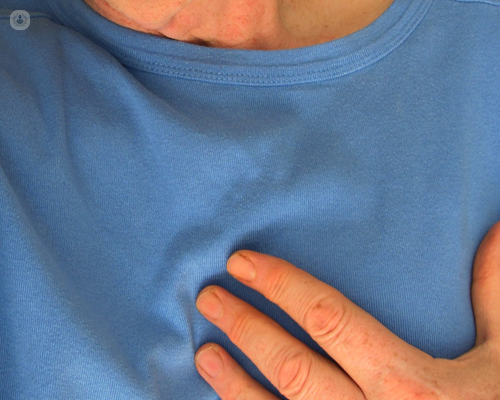When chest pain is related to cardiac issues
Written in association with:Chest pain can be a concerning symptom, especially when it's related to cardiac issues such as heart attacks. Understanding when chest pain may indicate a heart problem is crucial for timely intervention and treatment. In this informative article, leading consultant cardiologist Dr Waqas Khan tells us all we need to know about cardiac-related chest pain.

How do I recognise cardiac-related chest pain?
Cardiac-related chest pain, often referred to as angina, occurs when the heart muscle doesn't get enough oxygen-rich blood. This can happen for several reasons, including blocked or narrowed coronary arteries. The pain associated with heart conditions often has distinct characteristics:
- Location: Cardiac chest pain typically manifests in the centre or left side of the chest. It may feel like pressure, tightness, or squeezing.
- Radiation: The pain can radiate to other parts of the body, including the shoulders, arms (often the left arm), neck, jaw, or back.
- Duration: Chest pain related to heart issues often lasts more than a few minutes. It may come and go, particularly with physical exertion or emotional stress.
- Associated symptoms: Cardiac chest pain can be accompanied by other symptoms such as shortness of breath, sweating, nausea, dizziness or a rapid or irregular heartbeat.
What are the causes of cardiac-related chest pain?
Several heart conditions can cause chest pain, including:
- Coronary artery disease (CAD): This is the most common cause of cardiac chest pain. CAD occurs when the coronary arteries, which supply blood to the heart muscle, become narrowed or blocked due to the build-up of plaque.
- Myocardial infarction: A heart attack, or myocardial infarction, occurs when a coronary artery becomes completely blocked, cutting off blood flow to part of the heart muscle. This causes intense chest pain, which is a medical emergency.
- Pericarditis: The pericardium, the sac surrounding the heart, is inflamed. It can cause sharp, stabbing chest pain that may worsen with deep breaths or lying down.
- Aortic dissection: A rare but life-threatening condition in which the inner layer of the aorta tears. This can cause sudden, severe chest pain that may feel like a tearing sensation.
- Angina pectoris: This is chest pain or discomfort due to coronary artery disease. Stable angina occurs predictably with exertion, while unstable angina can occur suddenly and unpredictably, often signalling a higher risk of a heart attack.
When should I seek medical help for chest pain?
Chest pain should never be ignored, especially if it's sudden, severe, or accompanied by other symptoms like shortness of breath, sweating or fainting. Immediate medical attention is essential if:
- The pain is intense and does not improve with rest.
- The pain is new, unexpected, or different from your already diagnosed conditions.
- You experience other symptoms like shortness of breath, nausea or a cold sweat.
- You suspect you are having a heart attack.
Chest pain related to cardiac issues is a serious symptom that requires prompt evaluation by a healthcare professional. If you or someone you know experiences chest pain, especially if it is accompanied by other warning signs of a heart condition, seek medical help immediately. Early diagnosis and treatment can be life-saving.
Are you looking for gold-standard care regarding chest pain and cardiac issues? Arrange a consultation with Dr Khan via his Top Doctors profile.


